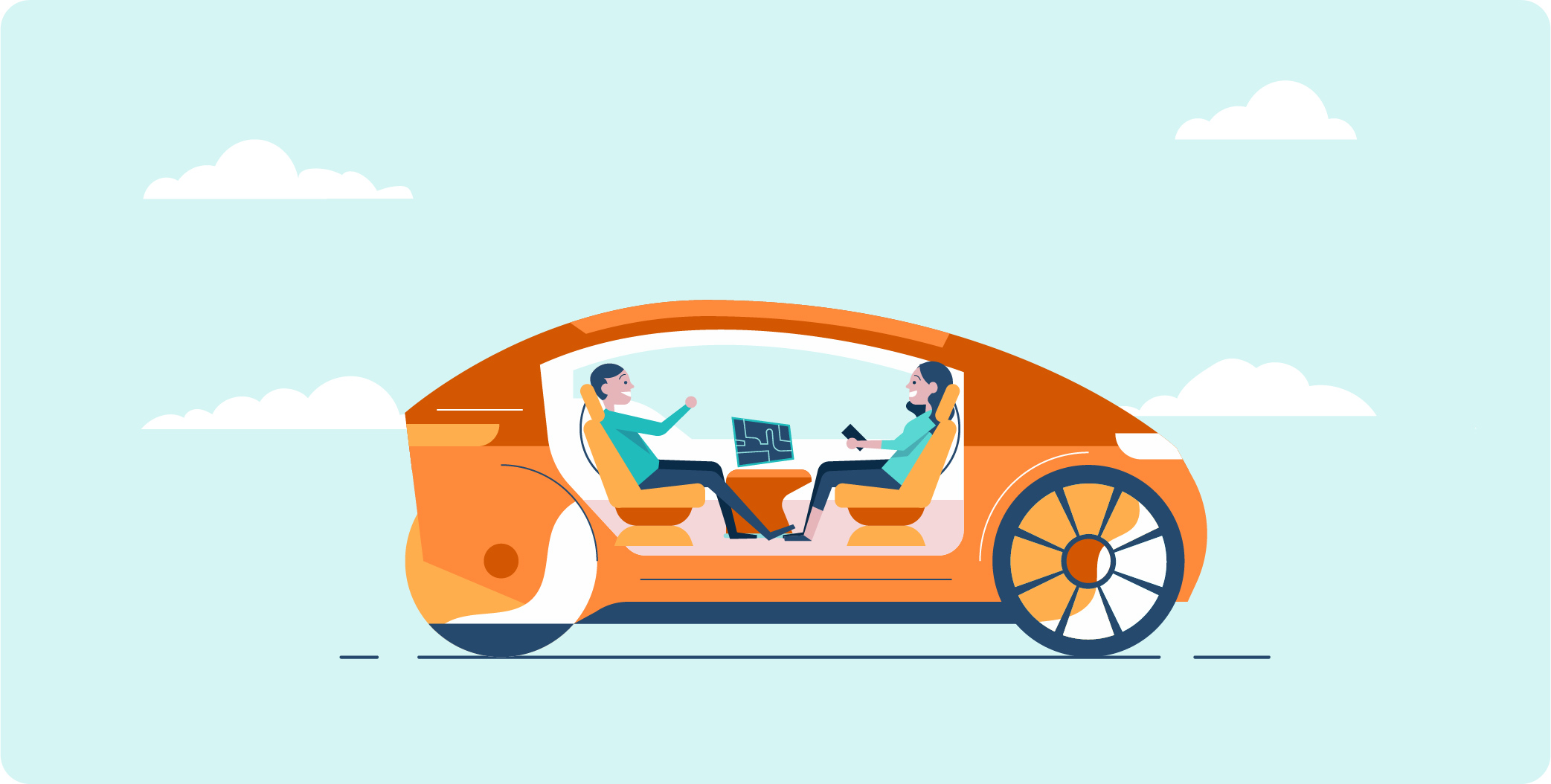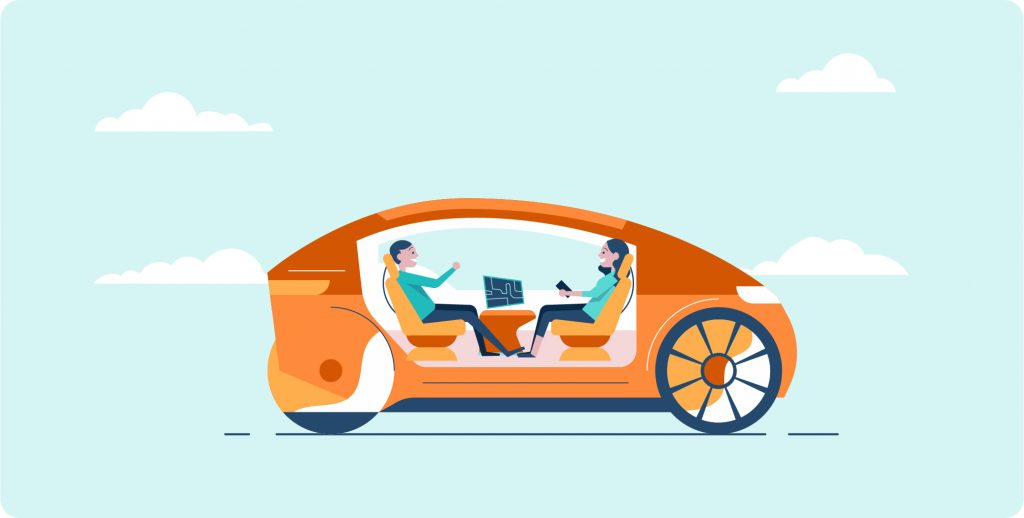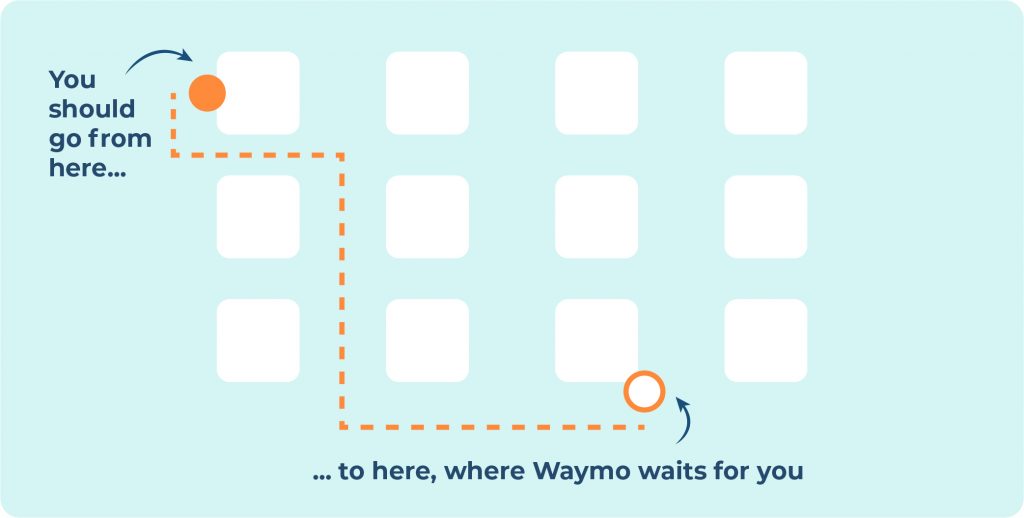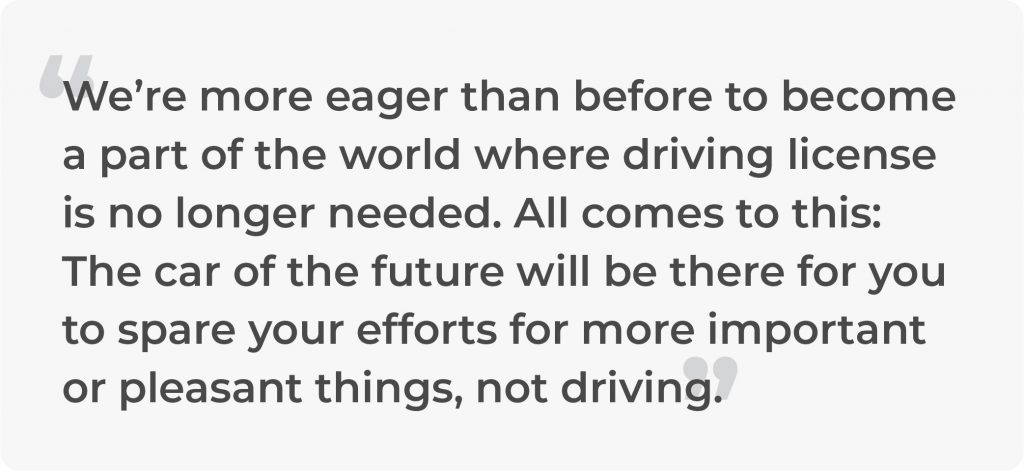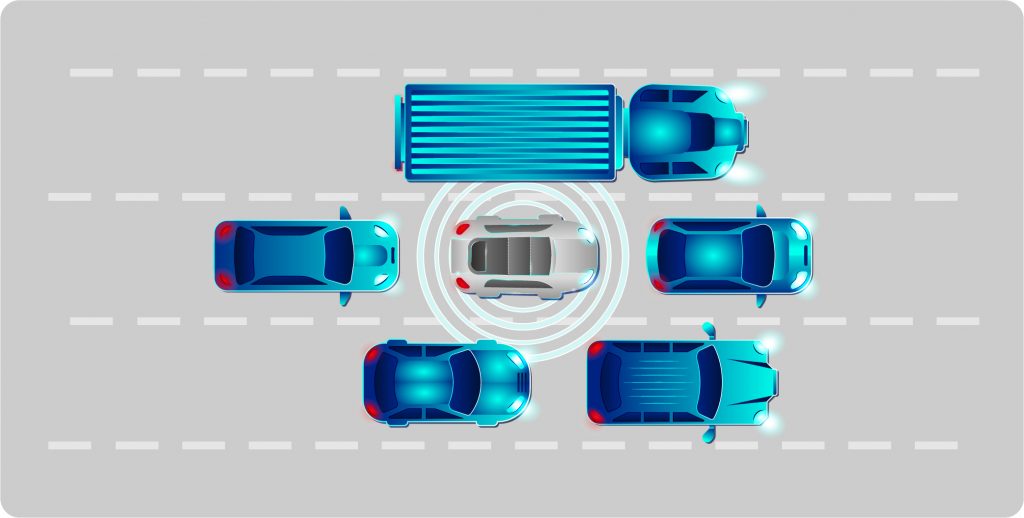The new market is emerging before us and it is for self-driving cars. Yet, before the present day car industry becomes a thing of the past, there will be a chain reaction of well-anticipated along with unplanned disruptions. What will they be and how the industry is getting through the first transformative stages? See the topic discussed in detail in our article below.
written by:
Veronica Chizh
The new market is emerging before us and it is for self-driving cars. Yet, before the present day car industry becomes a thing of the past, there will be a chain reaction of well-anticipated along with unplanned disruptions. What will they be and how the industry is getting through the first transformative stages? See the topic discussed in detail in our article below.
Undoubtedly, the advent of the era of driverless cars implies modifying or eradicating a multitude of today’s phenomena, such as public roads and transport, service centers, driving licensing and overall transport regulations. Apart from technical and legal aspects, ethical and psychological elements of transition also deserve close review. Numerous blockers to the industry, if pending resolution, will put the whole industry advancement on hold. See how industry players deal with the obstacles on their way.
“Shut up and relax, human”
Are you ready for the AI behind the wheel unrestricted by human’s control? You may well be not, but this is the most probable evolution path that public transport will take. With the fleets of driverless cars and shuttles at our disposal tomorrow, there can hardly be an option of split responsibility between a human and a smart car [Split responsibility means human takes control over a smart car should a sticky situation occur]. All is down to the danger such scheme carries. Surprised? Such a bold move is unlikely to be warmly received by the public at the start, and car manufactures stick to a staged shift from half-automated car to a fully self-driving vehicle. On the contrary, Google imagines only a 100% autonomous car hitting the market and its resolution is backed by a series of studies. They point to the human’s inability to stay focused on the ride once AI takes control. “We saw human nature at work: People trust technology very quickly once they see it works. As a result, it’s difficult for them to dip in and out of the task of driving when they are encouraged to switch off and relax”, Google says in its report.
“Play by my rules or get out”
A forthcoming transformation makes car manufacturers feel uneasy, as this change will undermine the present day industry. However, the automotive industry isn’t alone in its wish to slam on the brakes down the road to smart future. Smart cars will require a new infrastructure and city planners will have much headache rebuilding a good deal of today’s cities.
Lack of proper infrastructure is a frustrating thing already today, at the dawn of driverless cars industry. Say, you need your Waymo taxi to pick you up at the shopping mall. Bags and packages in your hands, you now have to go and find the corner where the driverless car waits for you. A smart car cannot drive itself to whatever point that may be convenient for you as it can park at the designated spots only. The story repeats itself when you have to leave the car and bring the stuff home from the exact stop point the car deemed acceptable to park, not you. In other words, existing roads are troublesome for the driverless cars to navigate with few spots to park.
However, the most distressing part can actually be driving. Densely populated areas can be a shock to the car because of reckless human driving, accidents or emergencies. These incidents may take only seconds for a human driver to retune and will result in a complete brain freeze for the AI. This is a reason why an AI-enabled car can easily navigate only strictly limited and carefully mapped city roads.
“Play by my rules or get out, human” – that’s the impression it gives.
“No offence, I’m programmed to kill you”
A uniform decision is also pending on a number of ethical issues. Say, who the smart car should save first: a driver or a pedestrian? Mercedes-Benz’ announcement provoked a public outrage, after it made clear that their smart car would be programmed to save the driver first rather than a pedestrian. This resolution was lately revoked by the automotive giant. At the same time, a car designed so that the driver suffers most will badly hit the company’s bottom line.
To reveal additional issues demanding public debate, the Moral Machine quiz was launched. Roughly speaking, it collects public opinion on whom the car should kill if it faces a choice. A child or an elderly, a wealthy-looking man or a homeless, a woman or a man? So far, should the poll results be reflected in the government regulation, smart cars would be given a green light to hit a shabby looking elderly man. Once the algorithm is launched it will simply enact the major vote. “No offence, human. You’d better be rich and young and… a woman”.
Tomorrow isn’t that inspiring, eh?
Problems in the smart industry seem to pile up quickly. But yet not as quickly as the best and the brightest come up with the ideas how to settle things up. Cheer up, no one would invest such money into this endeavor was it a total messup.
“Spare your efforts for important things, human”
A shift in consumer behavior may be an indication that we are willing to unload a tedious task of driving for good. Millennials, Z and X-gens are growing more detached from possessing a car. European car sharing market is expected to reach USD 4 billion growing at a CAGR of over 33.7% from 2018 to 2024 (Graphical Research). Berylls Strategy Advisors predict a 15-percent decline in car sales by 2030 in the US, which for the first time in history cannot be traced down to an economic decline.
The number of young Germans applying for their driving licenses has also shrank by 28 percent in the past decade. Similar trend seizes almost all major economies, with UK alone showing 40 percent drop in license holders. Seems like we’re more eager than before to become a part of the world where driving license is no longer needed. Thus, a fertile ground for driverless commute at the backseat is being prepared. All comes to this: The car of the future will be there for you to spare your efforts for more important or pleasant things, not driving.
“I’ll drive you down the safest and the shortest route possible”
How come that driverless cars, brilliantly programmed to follow the driving regulations, are still aliens on the road? Strange as it may sound, autonomous cars are unsafe only because human driving is so careless. Their super safe and prudent driving culture disrupts the system made by humans and for humans, which is always half-order and half-havoc.
Nevertheless, law-obedience apart, smart cars will become totally irresistible for another reason. Think of radio transmitters replacing traffic lights, higher-capacity mobile and wireless data networks handling both vehicle-to-vehicle and vehicle-to-infrastructure communication, and roadside units providing real-time data on weather, traffic, and other conditions (Harvard Business Review). Introducing AI to public transport may free the city streets from accidents and traffic jams due to flawless real-time data exchange between AI-enabled vehicles.
For those unwilling to share the lane with robots there’s also an option. To eliminate tension between human drivers and self-driving cars isolated underground infrastructure is being constructed. In 2018, Elon Musk unveiled his plans to build the tunnel under LA which would allow only self-driving cars with test tunnel open already in December that year. Alphabet, Google’s parent company, is likely to follow the same path. As the details leak out on its smart city to be constructed soon (projected to grow where Toronto’ waterfront now lies), the smart giant is planning to automate and bury underground waste managing and freight deliveries, along with delivery drivers. This will not only reduce the above-ground traffic, but will also help tackle urgent environmental issues.
“Take your time, human. See what’s best for yourself”
As Jean-François Bonnefon and Azim Shariff, the designers of the above mentioned Moral Machine quiz, highlight in their interview to Medium, issues of moral and ethical nature should be left to the government to solve, not the market. “The advantage of government involvement is you don’t leave ethical decisions up to market. I don’t trust the market to find the most ethical discussion. Having each manufacturer create their own guidelines, so consumers can choose between algorithms, would be very chaotic”, Mr. Shariff says. This will take the task off for manufacturers to create an all-conforming standard of AI-run machine which, if assigned, would be close to impossible to do. Government regulations may vary from country to country to reflect cultural discrepancies. However, well-accepted human values will remain intact across the globe. Say, a jaywalking Japanese is a very rare phenomenon. At the same time, crossing the street with eyes glued to the phone is a regular thing for a New Yorker. These and other regional peculiarities are likely to be captured in local regulations which foreigners will abide by the way they do today.
Precisely how long will it take for driverless cars to be fully adopted by global community is unclear. The issue of human-machine interaction is highly speculative, and humans very unwillingly cede control over their lives to AI. At the same time, healthcare institutions, once violently resisting artificial assistance, are now tightly bound to precision and reliability of AI-driven technologies. Will the automotive industry replicate this pattern? Wait and see.
For more on smart cars contact us at request@qulix.com or visit our website.

Contacts
Feel free to get in touch with us! Use this contact form for an ASAP response.
Call us at +44 151 528 8015
E-mail us at request@qulix.com

